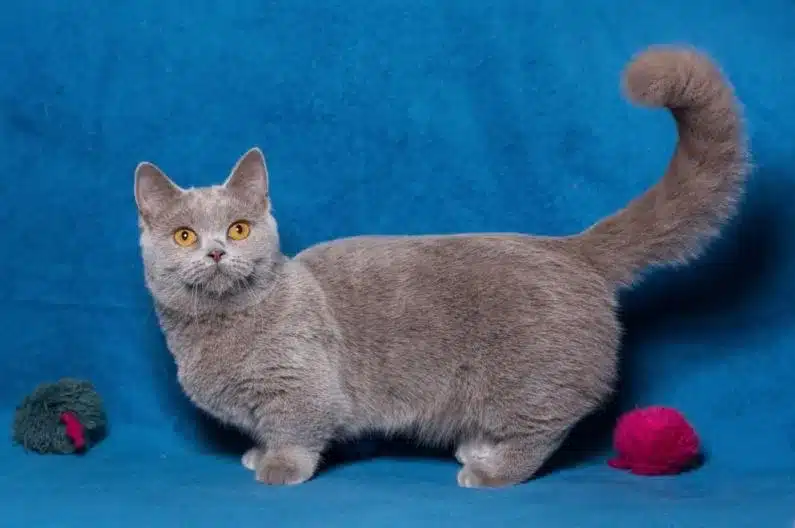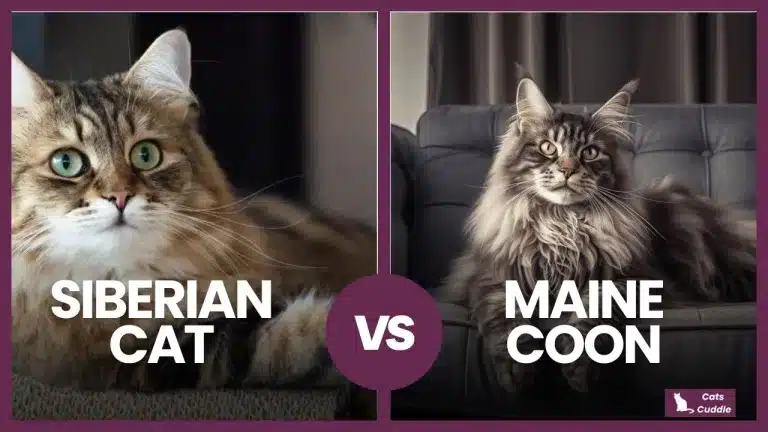How Much Does a Munchkin Cat Cost? [2024]
When considering adding a Munchkin cat to your family, the first question that often arises is: How Much Does a Munchkin Cat Cost?
Munchkin cats, known for their short legs and playful nature, have captivated the hearts of many pet enthusiasts. Their distinctive appearance and friendly disposition make them a popular choice for a household pet.
The initial purchase price of a Munchkin cat can vary significantly, typically ranging from a few hundred to several thousand dollars, depending on various factors such as pedigree, coat type, color, and breeder reputation.
| Purchase Price | $600 – $3,000 |
| Initial Costs | $555 – $1,465 (excluding purchase) |
| Monthly Expenses | $61 – $381+ |
| Health Care | $100 – $300 annually (plus insurance) |
| Grooming | $10 – $70 monthly |
| Lifetime Cost | $15,240 – $39,075 |
How Much Does a Munchkin Cat Cost?
- $600 – $3,000
The cost of a Munchkin cat can vary widely. A kitten from a reputable breeder may cost between $600 and $3,000. This price range reflects factors like the cat’s lineage, age, and physical characteristics.
Cats with rare coat colors or patterns, or those from award-winning lineages, tend to be at the higher end of the price spectrum.
Adopting a Munchkin from a rescue may be less expensive, with adoption fees typically ranging from $75 to $150, but these opportunities are less common due to the breed’s popularity and relatively limited availability.
Initial Costs
- $555 – $1,465
After purchasing a Munchkin cat, you’ll encounter various initial costs essential for your new pet’s well-being. These expenses include microchipping, which ranges from $40 to $60, ensuring your cat’s safety and ease of identification if lost.
Setting up your home for your new feline friend also means investing in necessary supplies like food and water bowls, litter boxes, and a comfortable cat bed, with costs potentially totaling between $200 and $500.
Initial veterinary care is another crucial aspect, encompassing vaccinations, health checkups, and potentially, spaying or neutering. These veterinary expenses can run from $100 to $500, depending on the services needed.
Additionally, consider the cost of basic accessories like collars, toys, and grooming tools to ensure your Munchkin cat’s health and happiness from the start.
Monthly and Annual Expenses
- $61 – $381+
Owning a Munchkin cat entails recurring costs that include food, grooming, healthcare, and insurance. Monthly food expenses can range from $20 to $70, depending on the brand and type of food, whether it’s premium dry kibble or high-quality wet food.
Grooming costs vary too, especially if you opt for professional services, with monthly expenses between $10 and $70.
Healthcare costs are another significant factor, with routine vet visits, vaccinations, and preventive medications like flea and tick treatments. These can total around $100 to $300 annually, but having pet insurance, which can cost between $15 and $50 monthly, can help manage unexpected health-related expenses.
On a yearly basis, owning a Munchkin cat might cost between $1,270 and $2,605, considering all these factors. This estimate underscores the importance of budgeting for both the predictable and unforeseen costs of pet ownership.
Health Care and Insurance
| Routine Veterinary Care | $100 to $200 annually |
| Pet Insurance | $20 to $30 monthly |
Munchkin cats, like all breeds, require regular health care, which can include annual check-ups, vaccinations, and treatments for any health issues that may arise. Routine veterinary care is estimated to cost between $100 and $200 annually.
However, certain health conditions common in Munchkin cats, such as spinal problems or heart issues, could lead to significant medical expenses. These costs can escalate into thousands if long-term treatment or surgery is needed.
Pet insurance is an option that Munchkin cat owners should consider to offset potential high medical costs. Monthly premiums can range from $20 to $30, but this can vary based on coverage plans, the cat’s age, and health status.
While insurance represents an added expense, it can provide financial relief in the event of unexpected health issues, making it a critical consideration for responsible pet ownership.
Maintenance and Grooming
| Food | $20 – $70 monthly |
| Grooming Supplies | $10 – $70 monthly |
| Professional Grooming | $25 – $70 per session |
| Litter and Supplies | $15 – $30 monthly |
| Toys and Enrichment | $10 – $50 monthly |
Maintenance and grooming are vital for Munchkin cats to ensure they remain healthy and comfortable. Due to their unique body structure, Munchkin cats may require more attention in grooming, particularly if they have longer fur.
Regular brushing, at least once a week, is recommended to prevent matting and reduce shedding. Professional grooming sessions, which may include bathing, nail trimming, and ear cleaning, can cost between $25 and $70 per visit, depending on the services provided.
In terms of maintenance, Munchkin cats need a clean and safe living environment. Litter box maintenance is crucial, with costs for litter and related supplies ranging from $15 to $30 monthly.
Ensuring that your Munchkin has access to clean water, a nutritious diet, and a comfortable resting area is essential for their well-being.
Proper grooming and maintenance not only contribute to the physical health of Munchkin cats but also to their overall happiness and quality of life.
Additional and Unexpected Costs
- $1,000 to $4,000
When budgeting for a Munchkin cat, it’s crucial to account for potential additional and unexpected costs. Emergency medical treatment, for instance, can range from $1,000 to $4,000, depending on the severity of the issue.
Regular health maintenance like flea and tick prevention, along with unexpected illnesses or injuries, can add to the financial burden.
Behavioral training might be necessary if your Munchkin exhibits issues like aggression or litter box aversion, which can also incur costs.
Furthermore, if you travel frequently or have a busy schedule, you may need to consider the cost of pet sitting or boarding services, which can vary widely based on your location and the level of care provided.
Finally, there’s the potential for property damage. Munchkin cats, like all cats, may scratch furniture or have accidents outside the litter box, leading to replacement or repair costs.
These factors highlight the importance of having a flexible budget and emergency fund for unforeseen expenses in pet ownership.
Budgeting for a Munchkin Cat
Owning a Munchkin cat is a long-term financial commitment that requires careful budgeting and financial planning. Here are some tips to help manage the costs effectively:
- Prioritize Health Care: Regular vet check-ups can prevent larger expenses down the line. Consider setting aside a monthly budget for health care and an emergency fund for unforeseen medical issues.
- Choose Insurance Wisely: Pet insurance can be a lifesaver in managing unexpected medical costs. Compare plans and choose one that offers comprehensive coverage at a reasonable monthly premium.
- Invest in Quality Supplies: While higher-quality items may have a higher upfront cost, they can be more durable and cost-effective in the long run. Look for sales or bulk purchase options for items like food, litter, and grooming supplies.
- DIY Grooming and Care: Learn to perform basic grooming at home, such as brushing, nail trimming, and ear cleaning. This can significantly reduce the cost of professional grooming services.
- Home-made Toys and Entertainment: Instead of buying new toys frequently, create homemade toys or rotate existing ones to keep your Munchkin engaged without spending extra money.
By implementing these strategies, you can enjoy the companionship of your Munchkin cat without undue financial strain, ensuring a happy and healthy life for your furry friend.
Frequently Asked Questions (F.A.Q)
What is the history of the Munchkin cat breed?
Munchkin cats were first recognized in 1983 in Louisiana, USA, from a pregnant stray named Blackberry. Her litter included short-legged kittens, marking the start of the breed. The International Cat Association (TICA) granted championship status to the breed in 2003.
Are Munchkin cats prone to any specific health issues?
Yes, Munchkin cats can have genetic issues like lordosis, where the spine dips near the shoulder blades, causing organ compression in severe cases. They’re also at risk for osteoarthritis and pectus excavatum, a condition leading to a hollowed chest.
Do Munchkin cats have any unique personality traits?
Munchkin cats are known for being affectionate, sociable, and playful. They are intelligent and enjoy engaging in games like fetch, and despite their short legs, they are agile and can run fast.
Can Munchkin cats live with families and other pets?
Yes, Munchkin cats are generally good with children and other animals. They are friendly and enjoy interacting with their human family members and other pets
Wrapping Up
Owning a Munchkin cat brings joy and companionship, but it’s essential to understand the financial commitment involved. From the initial purchase to ongoing care, grooming, health expenses, and unexpected costs, being prepared financially is key to providing a loving and stable environment for your Munchkin cat. By budgeting wisely, opting for cost-effective care strategies, and preparing for unforeseen expenses, you can ensure a fulfilling and happy life with your petite feline friend. Remember, the investment in your Munchkin cat’s well-being is not just monetary but also a commitment to their lifelong health and happiness.


![Dilute Tortie – What Makes Them So Special? [2024]](https://catscuddle.com/wp-content/uploads/2024/03/Dilute-Tortie-3-768x490.webp)
![Munchkin Cat Life Expectancy: How Long Do They Live? [2024]](https://catscuddle.com/wp-content/uploads/2024/03/Munchkin-Cat-Life-Expectancy-768x512.webp)
![Munchkin Cats Breed Guide: History, Personality, Care [2024]](https://catscuddle.com/wp-content/uploads/2024/03/Munchkin-Cats-Breed-Guide-768x575.webp)
![Torbie Cat: History & Origin, Personality, Care [2024]](https://catscuddle.com/wp-content/uploads/2024/03/Torbie-Cat-1-768x432.webp)

![What are Magpie Cats? – Breed, Personality, Care [2024]](https://catscuddle.com/wp-content/uploads/2024/03/What-are-Magpie-cats-768x441.webp)